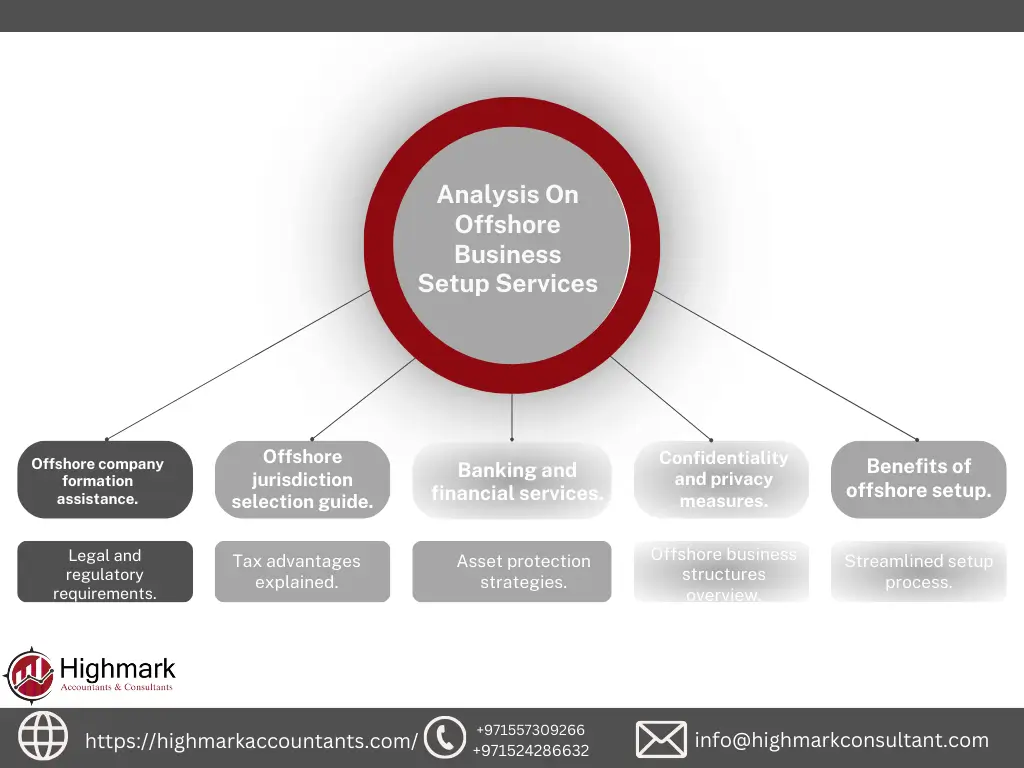Offshore Company Formations and Know Your Customer Laws: Staying Compliant
Just How Offshore Company Formations Work: A Detailed Summary for Business Owners
Offshore firm formations can provide substantial advantages for business owners looking for tax obligation optimization and possession security. The procedure includes several important actions, beginning with careful territory selection and complete paperwork prep work. Engaging specialist solutions is necessary for compliance. However, lots of neglect the continuous obligations that follow preliminary enrollment. Understanding these intricacies can make a considerable difference in leveraging offshore chances efficiently. The next steps are crucial for long-term success.
Comprehending Offshore Business: What They Are and Why They Issue
Although the idea of overseas companies might appear facility, recognizing their fundamental nature and importance is essential for both people and businesses seeking to enhance their economic strategies. Offshore companies are entities signed up outside the person's nation of residence, frequently in jurisdictions that provide desirable regulative environments. These services can offer numerous advantages, such as tax optimization, property security, and boosted personal privacy.
For business owners, establishing an offshore firm can facilitate global trade, lower functional costs, and increase market reach. Additionally, offshore firms typically permit streamlined compliance with global guidelines. People might additionally utilize overseas frameworks to secure individual assets from political or financial instability in their home countries. Eventually, the charm of overseas companies hinges on their capacity to improve economic versatility and offer tactical benefits in a significantly interconnected international economic climate - Offshore Company Formations. Understanding their functional structure and benefits is essential for making educated decisions
Selecting the Right Territory for Your Offshore Firm
Selecting the suitable territory for an offshore company is essential for making best use of tax advantages and guaranteeing conformity with local regulations. Different territories provide differing tax incentives and governing environments that can greatly affect business operations. A careful assessment of these elements is essential for informed decision-making.
Tax Obligation Benefits Summary
When thinking about the facility of an offshore business, comprehending the tax obligation advantages related to numerous jurisdictions is vital. Various locations use unique advantages, such as reduced or zero corporate tax prices, which can considerably enhance productivity. Some jurisdictions provide tax rewards for certain types of businesses, attracting business owners seeking decreased tax obligation liabilities. Additionally, specific nations implement favorable tax obligation treaties that decrease double taxation on global earnings, ensuring that companies retain more earnings. The choice of jurisdiction additionally impacts value-added tax (BARREL) and various other local taxes. Business owners need to assess these factors meticulously to choose a place that aligns with their organization objectives, optimizing tax obligation effectiveness while continuing to be certified with global policies.
Regulatory Environment Considerations
Choosing the appropriate jurisdiction for an overseas company requires a detailed understanding of the regulatory atmosphere, as various nations enforce varying degrees of compliance and administration. Entrepreneurs have to assess aspects such as lawful structures, tax policies, and reporting commitments. Territories like the British Virgin Islands and Cayman Islands are usually favored for their business-friendly legislations and marginal coverage demands. Conversely, some nations might enforce stringent laws that could make complex operations and increase costs. Additionally, the political security and track record of a jurisdiction can influence the long-lasting viability of the offshore firm. Mindful consideration of these regulatory elements is crucial to ensure that the selected jurisdiction aligns with the firm's functional needs and tactical goals.
Functional Preparing the Essential Documentation
Preparing the required paperwork is an essential action in the overseas firm formation procedure. Entrepreneurs need to collect numerous legal and recognition papers to promote their business's facility in a foreign jurisdiction. Normally, this includes a comprehensive company strategy detailing the company's purposes and operational approaches. Furthermore, individual recognition files, such as keys or chauffeur's licenses, are called for from the business's shareholders and supervisors.
In a lot of cases, proof of address, like energy bills or financial institution declarations, is required to validate the identities of the included parties. Specific types determined by the jurisdiction, including application types for registration, have to be completed precisely. Some territories might also need an affirmation of the nature of company tasks and conformity with regional regulations. Completely preparing these records guarantees a smoother registration procedure and aids reduce prospective hold-ups or complications, ultimately establishing a strong foundation for the offshore entity.
Engaging Expert Solutions for Offshore Development
Involving specialist solutions in overseas development can significantly improve the performance and performance of the procedure. Business owners typically deal with intricacies that can be frustrating, making experienced guidance indispensable. Specialist companies focusing on offshore formations supply a wide range of knowledge concerning territory choice, firm structure, and regional market problems.
These experts can help in preparing vital paperwork, making sure precision and conformity with certain demands. They likewise assist improve communication with neighborhood authorities, reducing the likelihood of misconceptions or hold-ups. Furthermore, expert services can provide insights into calculated benefits, such as tax obligation advantages and asset security, customized to the entrepreneur's certain demands.
Navigating Regulatory Compliance and Legal Requirements
Recognizing the governing landscape is essential for business owners starting on overseas business developments. Conformity with worldwide laws and neighborhood legislations is vital to stay clear of legal mistakes. Each territory has particular requirements regarding firm enrollment, reporting, and taxation, which need to be extensively investigated.
Business owners must familiarize themselves with the guidelines governing business framework, ownership, and functional practices in the picked offshore place. Additionally, anti-money laundering (AML) and understand your client (KYC) regulations frequently use, needing proper paperwork and confirmation processes.
Involving with lawful experts that specialize in offshore solutions can provide important advice on navigating through these intricacies. Guaranteeing conformity not only safeguards the business from prospective lawful concerns however likewise boosts trustworthiness with partners, regulators, and financiers. By adhering to the proposed legal structures, business owners can effectively take advantage of the advantages of overseas firm formations while reducing risks associated with non-compliance.
Setting Up Banking and Financial Accounts

Once an ideal bank is determined, business owners typically require to prepare and submit different papers, consisting of proof of identification, business enrollment papers, and a summary of the designated organization tasks. (Offshore Company Formations)
Some financial institutions may also need a minimum down payment to open an account. Entrepreneurs must be prepared to answer inquiries concerning the resource of funds and company procedures. By thoroughly recognizing the financial landscape and abiding by the you can check here bank's requirements, entrepreneurs can secure their offshore company has seamless access to important economic solutions for reliable operation.
Maintaining Your Offshore Company: Continuous Responsibilities and Best Practices
Keeping an overseas company includes numerous recurring obligations that are vital for conformity and functional honesty. Secret elements include sticking to yearly conformity needs, maintaining exact financial documents, and understanding tax commitments. These components are vital for making sure the business's durability and legal standing in its jurisdiction.
Annual Compliance Demands
While establishing an offshore firm supplies many benefits, it likewise entails ongoing responsibilities that can not be neglected. Annual compliance demands differ by territory yet generally include sending financial declarations and yearly returns to regional authorities. Firms have to also pay annual fees, which can consist of enrollment renewals and tax obligations, depending upon the location. Additionally, several territories require keeping a licensed office and a neighborhood rep. Failing to follow these guidelines can lead to penalties, special info including penalties and even dissolution of the business. Business owners should likewise be mindful of any modifications in local legislations that might affect their compliance commitments. Staying notified and arranged is crucial for keeping the advantages of an offshore company while satisfying lawful responsibilities properly.
Maintaining Financial Records
Compliance with annual demands is just component of the recurring responsibilities related to offshore business administration. Keeping exact economic documents is important for ensuring transparency and responsibility. Business owners must systematically record all deals, consisting of income, expenditures, and properties. This practice not just help in internal decision-making yet likewise prepares the company for possible audits from governing authorities.
On a regular basis upgrading monetary declarations, such as earnings and loss accounts and annual report, is essential for tracking the company's financial health and wellness. Using audit software can streamline this process, making it simpler to generate reports and maintain compliance. Furthermore, entrepreneurs must think about looking for specialist accountancy services to guarantee adherence to local regulations and best techniques, therefore safeguarding the stability and online reputation of their overseas procedures.

Tax Obligation Commitments Review
Guiding via the intricacies of tax commitments is crucial for the successful monitoring of an offshore company. Entrepreneurs must understand the tax regulations of both their home nation and the territory where the offshore entity is developed. Conformity with neighborhood tax laws is vital, as failure to adhere can result in charges or legal concerns. Frequently filing necessary tax obligation returns, even when no tax obligation might be owed, is commonly required. In addition, maintaining current and accurate monetary documents is necessary for demonstrating conformity. Consulting from tax obligation professionals accustomed to international tax obligation legislation can assist navigate these responsibilities effectively. By carrying out ideal techniques, entrepreneurs can guarantee that their offshore operations stay economically sensible and lawfully compliant.

Often Asked Concerns
Exactly how Lengthy Does the Offshore Business Formation Refine Normally Take?
The offshore firm development process generally ranges from a few days to several weeks. Factors affecting the timeline consist of jurisdiction, documents needs, and responsiveness of monetary and lawful institutions associated with the configuration.
What Are the Costs Connected With Maintaining an Offshore Company?
The costs connected with maintaining an offshore business can differ commonly. They generally consist of yearly registration charges, conformity costs, accounting solutions, and possible legal charges, depending on the territory and specific company tasks involved.
Can I Open a Personal Savings Account for My Offshore Firm?
Opening up article a personal bank account for an overseas business is generally not permitted. Offshore accounts need to be business accounts, reflecting the business's tasks, thereby abiding by guidelines and ensuring appropriate economic management and legal liability.
Exist Restrictions on Foreign Ownership of Offshore Firms?

What Takes place if I Fail to Follow Offshore Regulations?
Failing to adhere to offshore policies can lead to extreme charges, consisting of large fines, loss of business licenses, and possible criminal fees. Additionally, non-compliance may result in reputational damages and problems in future service operations.
Offshore firms are entities registered outside the individual's nation of house, commonly in jurisdictions that use positive regulatory settings. Choosing the proper territory for an overseas company is vital for taking full advantage of tax obligation advantages and ensuring compliance with regional laws. When considering the facility of an overseas business, recognizing the tax advantages associated with different jurisdictions is important. Selecting the appropriate territory for an offshore firm requires a complete understanding of the governing setting, as various nations impose varying levels of compliance and governance. Additionally, the political security and reputation of a territory can influence the long-lasting stability of the overseas firm.